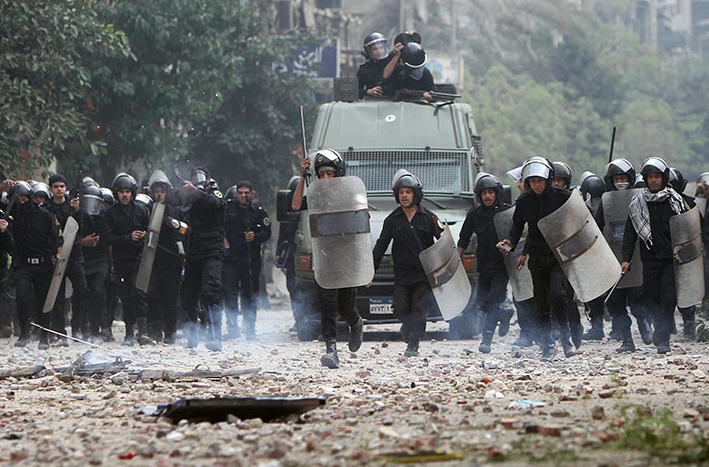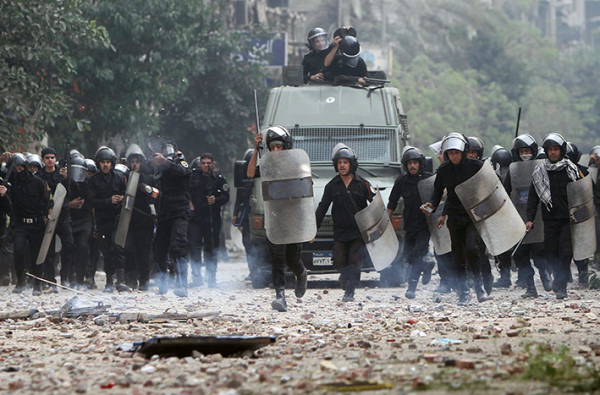
Is this the start of the second Egyptian revolution?
Egypt’s revolution entered a dangerous phase of confrontation on Sunday after the army attacked thousands of anti-junta protesters in Cairo, putting the viability of imminent parliamentary elections in serious doubt.
Several political parties and individual candidates said they were suspending their electoral campaigns after a weekend in which at least five people were killed and almost a thousand injured in some of the fiercest clashes seen since the heady days of February when Hosni Mubarak was ejected from power.
Protesters later retook Tahrir Square, in central Cairo, and vowed to stay put until the military authorities are removed. Many said they were ready to die for the revolution, which began in late January as an anti-Mubarak movement, but is now targeting the army generals of the Supreme Council of Armed Forces (Scaf) who replaced him.
Amid calls for a national government of salvation to be set up to face down the junta, the opposition figurehead, Mohamed ElBaradei, said he was ready to do “whatever it takes” to save Egypt from deepening crisis.
“I think what we’ve seen today is an excessive use of force, bordering on a slaughterhouse, against innocent civilians exercising their inalienable right to demonstrate,” ElBaradei told the Guardian.
But the interim authorities merely stated that the elections, due to start on 28 November, would go ahead as planned – and thanked officers for “self-restraint in dealing with the events”.
ElBaradei said: “It’s yet another indication that Scaf and the current government are failing to govern and I fully sympathise with the increasing calls coming from different quarters, including Tahrir, for a new government of national salvation that represents all shades of Egyptian society, one with full power.
“I will do anything to save the country from falling apart and what we are seeing right now is the country going down. People are calling on me to present this government, and I will do whatever it takes to save our country from falling apart.”
As Egypt’s interim cabinet gathered for an emergency meeting, several political parties and individual candidates announced they were suspending their electoral campaigns.
Critics say the elections will be meaningless if they are not accompanied by the retreat of Scaf and a return to civilian rule. So far the generals have refused to set a date for presidential elections, and say they will continue ruling until after a new constitution is created.
Street fighting continued in central Cairo on Sunday night, transforming parts of the city into a war zone. Protesters used rocks and molotov cocktails to repel attacks by armed riot police and built barricades to defend Tahrir. The Guardian saw volleys of teargas and rubber-coated steel bullets fired into the crowds by security forces, as well as “birdshot” pellet cartridges which appeared to be aimed at head height.

Major unrest spread beyond Cairo to the large cities of Suez and Alexandria, where at least one leading activist was killed. Mass demonstrations and attacks on police stations were reported in several other towns throughout the Nile Delta and southern Egypt.
Among those believed to have been arrested during the clashes was Bothaina Kamel, the country’s only female presidential candidate and an outspoken opponent of military rule. Speaking just before her detention, Kamel told the Guardian that the violence exposed “the ugly face of Mubarak that has been lurking behind Scaf all along”, and that she backed ElBaradei, who is also running for the presidency, to lead a transitional civilian government that would wrest control of the country back from the generals.
Such a move would throw Egypt into unprecedented confusion, with two rival political entities potentially declaring themselves to be the country’s legitimate government, and would almost certainly lead to a postponement of the poll.
But to have any chance of succeeding, any self-declared civilian authority would require support from a broad consensus of the political landscape, including the Muslim Brotherhood whose Freedom and Justice party are predicted to be the biggest single winners in the new parliament.
“What happens next is anyone’s guess because everything is up in the air right now,” said Issandr el-Amrani, a prominent blogger and analyst on Egyptian affairs. “The Islamists are relatively invested in elections taking place as planned, and we are still waiting for the political elite to put forward concrete alternative proposals. But the fact is that events on the ground are moving so fast that they are overtaking all these political considerations.”
Throughout Saturday protesters fought running battles with the central security forces, who were a hated symbol of brutality under the Mubarak dictatorship. Motorbikes ferried hundreds of wounded civilians to a makeshift field hospital on the edge of Tahrir Square, where a handful of doctors, aided by volunteers, struggled to deal with the influx.
“We are seeing many patients suffering from severe gas inhalation and flesh wounds from different types of ammunition,” explained Amr Wageeh, a 21-year-old medical student.
“I’ve been here four hours and helped treat over a hundred in that time; it’s hard because the teargas that’s being used is stronger than what we’ve dealt with in the past, and appears resistant to [the normal remedies of] vinegar and soda.”
“The elections can go to hell; Tahrir comes first, and we must complete our half-finished revolution before starting to organise a vote,” he continued.
“If Scaf think they can do to us what Assad has done to the Syrians and Saleh has done to Yemenis, they are in for a surprise. The Egyptians will do to Scaf what Nato did to Libya: the generals are a remnant of Mubarak, and they will be swept aside.”



